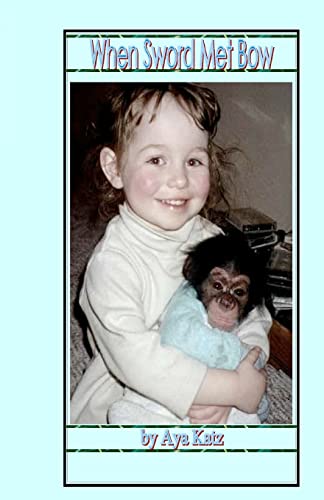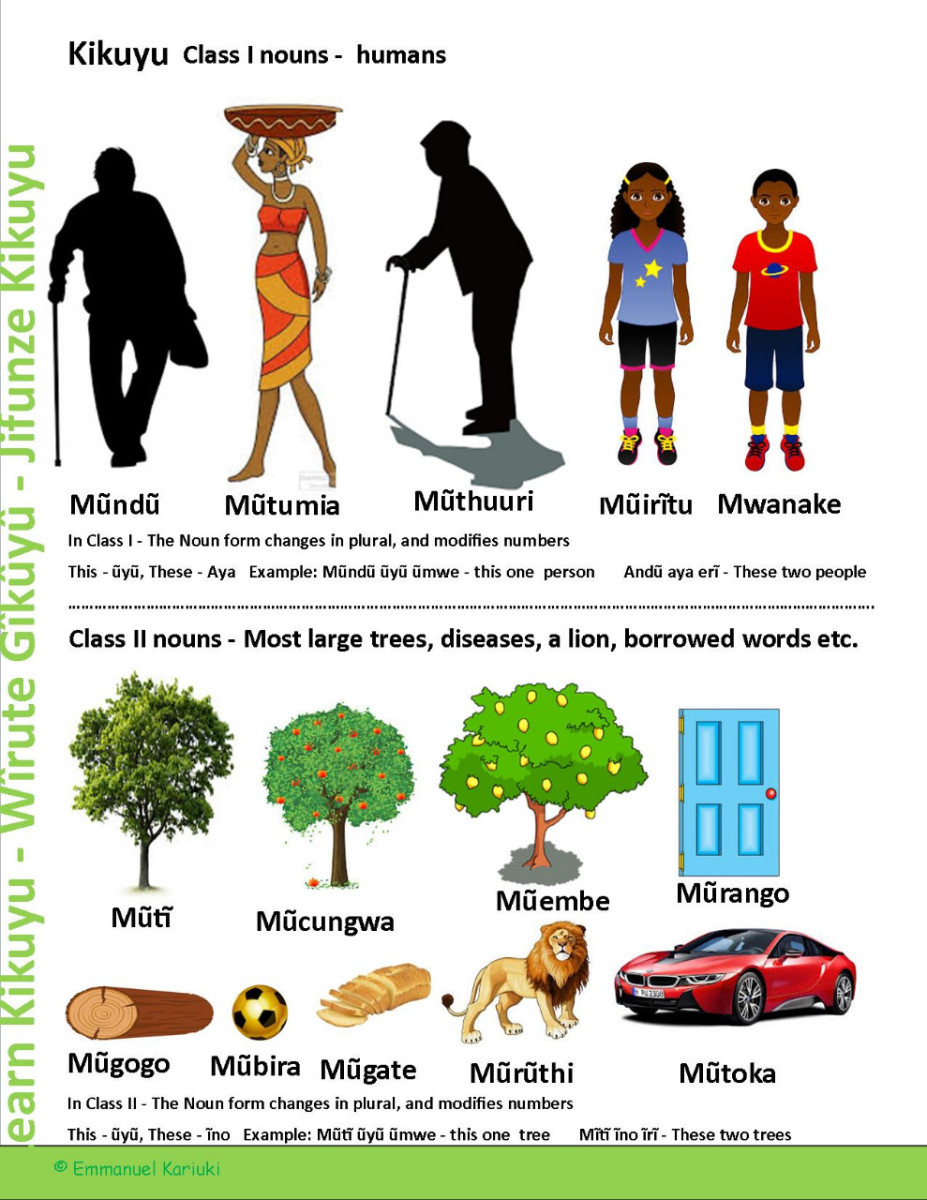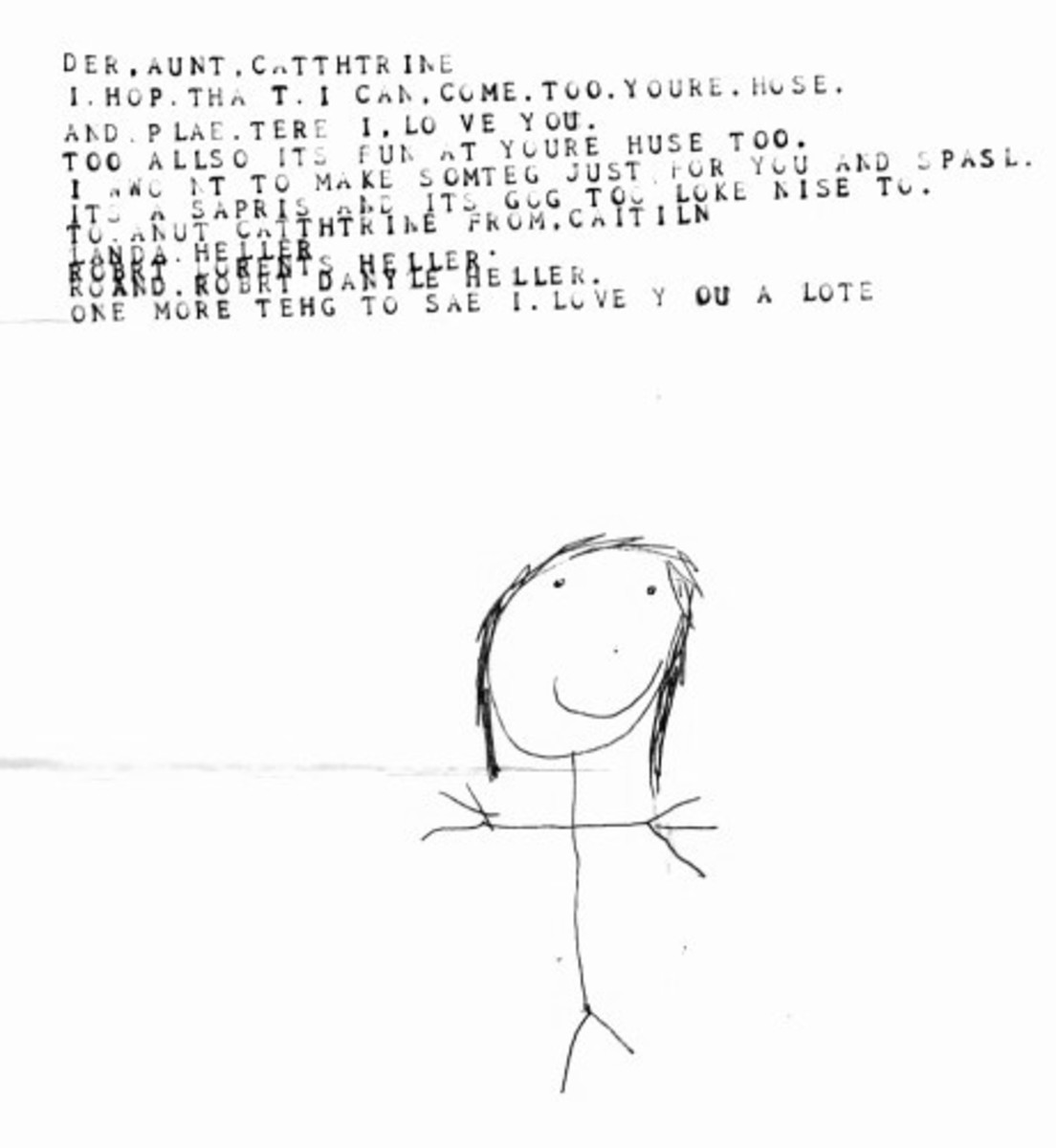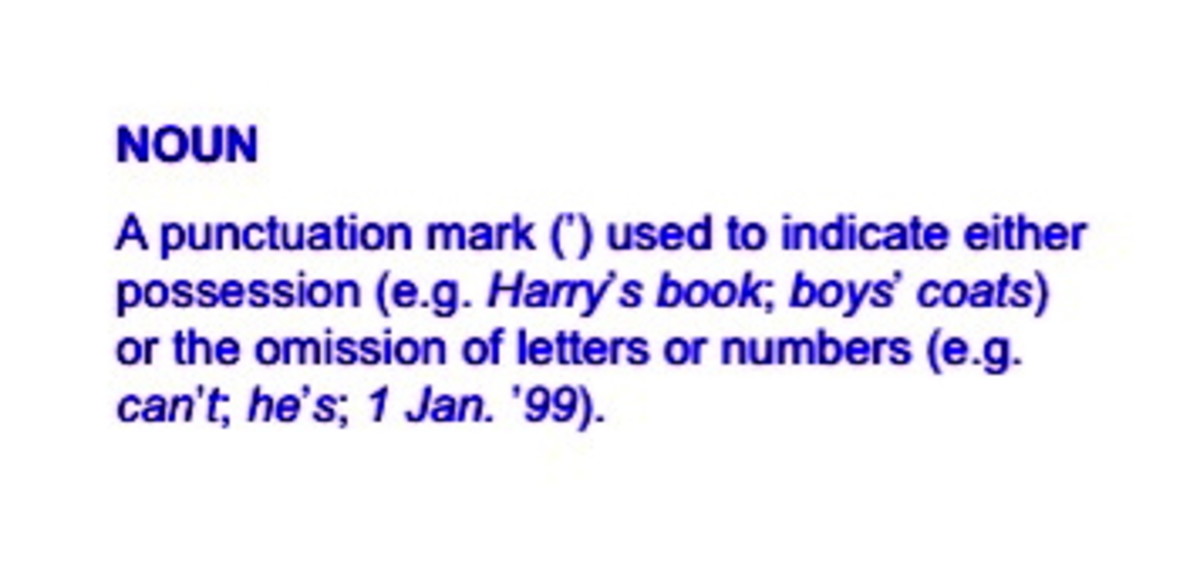Bow and Literacy
For a long time I've held off on publishing the next part of the story, for many reasons. This is the place where Bow's development shatters what everyone has believed so far about the cognitive abilities of chimpanzees. This is a contribution to science, and it ought to be published in a scientific journal, not on Hubpages.
I've tried to find the right forum in which to publish our breakthrough, but it has been rejected there. Some of my colleagues in primatology believe that I should just sit on the findings, until I have more proof -- enough proof to convince the most skeptical. Enough proof to get funding. Enough proof to make all our problems go away.
However, it's been over a year, and I believe that Bow and I have to hold on for the long haul. The sort of objective, double-blind testing that the scientific establishment wants will not be forthcoming anytime soon, for reasons that I will explain in detail in later hubs. Meanwhile we still have to live, eat fresh food and pay our bills. We have to keep doing what we're doing, even if there is no support. And we have to share this with the public, because people need to know that we exist, that we haven't given up, and that what has been published about chimpanzees is not all there is to know.

July 17, 2007
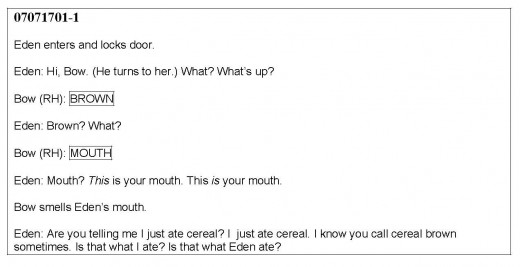
Brown Mouth
The last installment of Bow's story ended with the "Brown Mouth" incident. He was still using lexigrams, but now he was using them creatively, not just to ask for things, but to comment on events that he surmised had taken place outside his view. Eden had had cereal. Bow let her know that he knew this. He used the lexigram BROWN to refer to cereal. He used the lexigram "MOUTH" to refer to Eden's mouth. The utterance had a non-grammatical topic-comment type of structure.The topic was the cereal. The comment was that it had gone into Eden's mouth.Or at any rate, that her mouth smelled that way.
But is that language? Reams have been written on less impressive examples. But I'm not going to waste my breath, because the next thing that happened makes this pale in comparison.
Spelling Begins on August 17, 2007
For some time now, during the months of June and July of 2007, Eden and I had noticed that Bow was showing signs of literacy. We would put up a number of new lexigrams -- words Bow had never seen before -- and he would choose the right one to ask for what he wanted, without trial and error. We kept asking ourselves how he did this.
For instance, we put out a tent for Bow to play with. Two other unfamiliar words were posted along with the word for tent, which he also had never seen as a lexigram. (However, the word was in his vocabulary for spoken English.) He went directly for the lexigram tent without hesitating. The same thing happened when we presented the Hebrew word for tent as a lexigram for the first time with two other unfamiliar words.
Other things that made us suspect that Bow was relying on spelling were the fact that he often confused words that were spelled similarly, even if they meant completely different things. The Hebrew word for "chicken", and the Hebrew word for "chase" both end and begin with a taff. Bow sometimes confused them, but he did not confuse words for different foods or different games. Clearly, it was the spelling -- the sequence of letters that composed the lexigram -- that caught his attention.
One day, (August 17, 2007, to be exact), Eden decided to try an experiment to test Bow's ability to spell. I gave her a little hand-held computer like device that had a tiny keyboard. She took Bow into the outer pens and asked him how to spell his name. Without hesitation, Bow pressed the B, and the B came on the screen. He then pressed the O, but much more lightly, and the O did not appear on the screen. Then he stopped. He would not press the W, no matter what.
Encouraged by this incident, Eden took down all the lexigrams from the glass and replaced them with English letters. She posted the letters on the glass in no particular order. Some of the letters were posted in duplicate, in more than one spot. Then she brought Bow in, placing a selection of foods in his view. What follows is a transcript of what happened. (The reference numbers are to video clips that were later transcribed.)
August 17, 2007
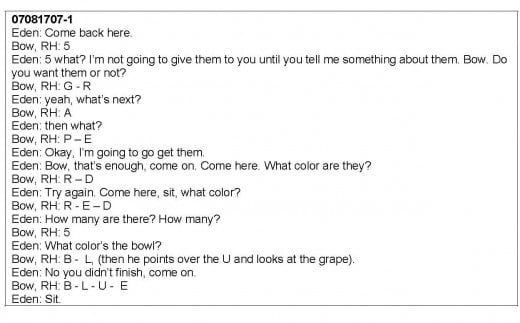
Bow could spell. He was sometimes lazy, and he sometimes left out vowels. His first attempt at the word "red" was "R-D". But he had no problem coming up with "R-E-D" when pressed. He also didn't like to spell out final, silent Es, as in the word "blue". Eden had to really pressure him. He preferred the spelling "B-L-U". An yet it's not because he didn't remember the sequence of letters. When Eden demanded that he spell it correctly, he could. He just didn't seem to see the point of that finale "E".
Which brings us to the most important aspect of Bow's spelling: Bow had not simply memorized a sequence of letters. He understood the phonemic principle. He understood what different letters contributed to the sounds of a word. He didn't seem nearly as motivated to use letters that contributed nothing to the overall sound.
Hebrew Spelling for the First Time
That very evening, energized by Bow's success in English, I took down the English letters and put up Hebrew. The transcript is numbered 7-18, because the clip wasn't downloaded from the camera until the next day, and the software had this annoying habit of labeling things by the day they were downloaded rather than the day they were shot. But it was that very evening, around 5:00pm, at dinner time. It was raining and thundering and lightening outside, and it was very dark in the pens. During one sequence, the lights went out for a second, when Bow was in the middle of spelling a word. When the lights came back on, he just kept on spelling. He didn't forget his place. I was really impressed with him!
August 17, 2007 5:00 pm --(downloaded following day)
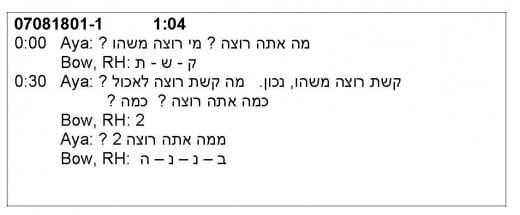
So, here is a translation into English of the exchange printed above in clip 07081801-1::
AYA: What do you want? Who wants something?
BOW: Bow.
AYA: Bow wants something, right. What does Bow want to eat? How many? How many do you want?
BOW: 2.
AYA: What do you want 2 of?
BOW: Banana.
August 17, 2007 --dinner continued....1
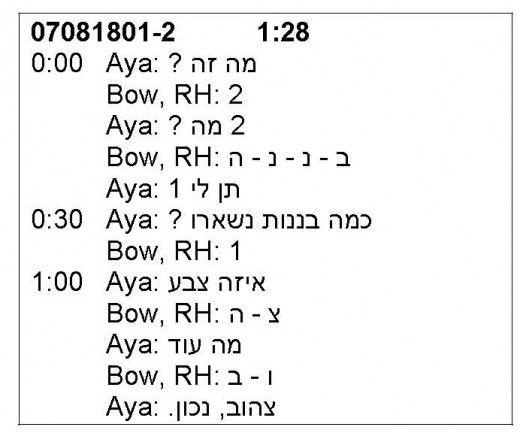
Banana clip continued
I went and got the two bananas that he had requested. (There were two bananas on the little serving table.) Then the following exchange (07081801-2) occurred:
AYA: What's this?
BOW: 2
AYA: Two what?
BOW: Banana.
AYA: Give me one. How many are left?
BOW: 1.
AYA: What color?
BOW: zadi - hey
AYA: What else?
BOW: vav -- bet
AYA: Yellow, right.
[zadi-hey-vav-bet spells the Hebrew word for yellow.]
Typographical Errors that Demonstrate Phonetic Ability
I'm not going to bore you with everything that Bow said that evening. In some ways it was all rather routine. These were the same sorts of things he had been saying for a long time using lexigrams, but now he was spelling them out. However, I will point out one error that he made. In spelling out the word for red, he used a non-final mem.
In Hebrew, some letters look a little different when they appear at the end of a word. A final mem and a non-final mem sound exactly the same. They just look different. Bow had always seen the Hebrew lexigram for the word "red" (adom) with a final mem at the end. If he had just memorized the sequence of letters, then he would have a chosen a final mem. That he made a typographical error, and pointed at a non-final mem, shows that he wasn't spelling from a visual memory. He was spelling from sound. He understood the phonetic representation in the Hebrew spelling system! This was a much bigger deal than the fact that he could request foods by name, or that he knew that two bananas minus one banana equaled one banana.
This was really big! This was literacy!
August 17, 2007 --dinner continued ...2

Translation of Clip 07081801-5
AYA: Now tell me what. Tell me what color this is.
BOW: Red. (alef-daled-vav-mem).
AYA: Not final mem? That's pretty close.
Grammatical Morphology: Plural endings
Up to this point, Bow's Hebrew and his English had this sort of pidgin quality. They sounded, when read out loud, like what Tarzan or Tonto or Frankstein's monster's language sound like in the movies -- all content words, but none of the grammatical markers that characterize human speech.
Why? Is it because chimpanzees can't do grammar? No. It was because he was using lexigrams -- and lexigrams can't do grammar.
All this was about to change. The next day, I took down the letters, put the familiar lexigrams back up, except that I added, using big red Hebrew letters, the plural ending -im (masculine plural) and -ot (feminine plural). I wanted to see if Bow knew how to use them. He did!
August 18, 2007
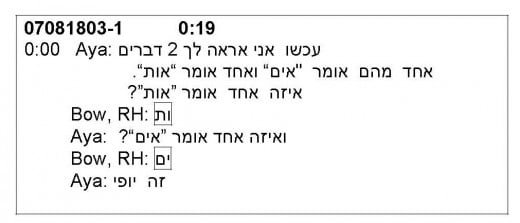
Translation of 077081803-1
AYA: Now I will show you two things. One of them says -im and one of them says -ot. Which one says -ot?
BOW: vav-taff.
AYA: Which one says -im?
BOW: yod- final mem.
AYA: That's great!
August 18, 2007
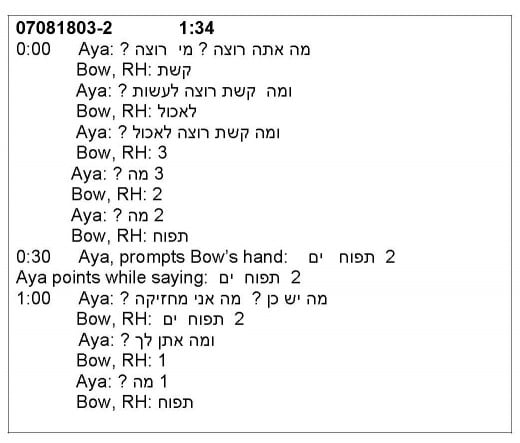
Use of the Plural Endings
In the clip to the right, Bow used the masculine plural ending on the masculine noun for apple. I'm not going to bother to translate the clip here, because what's interesting about it is the grammar, not the content. Bow was no longer using pidgin Hebrew. He had grammatical agreement for gender and number.
What's important to understand here is that I didn't teach this grammar to Bow. I just showed him that he could use the grammar he already knew because he could spell it out. Once this point was established, I took down the lexigrams, and Bow spelled out whatever he wanted. He needed no explicit instruction in grammar. Many other grammatical paradigms simply came to him. I never had to cue him into using them.
I have taught Hebrew on the college level. This kind of grammatical feat is very hard for non-native speakers to get into the habit of doing. It was not hard for Bow, because he had been exposed to Hebrew all his life. Spelling out words freed him to express everything that he had already internalized. In one day he went from no grammar to full grammar!
August 23, 2007
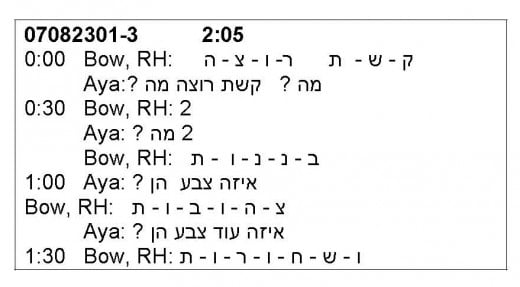
Clip 070823-01-3 Feminine Plural Endings
BOW: Bow wants
AYA: What? What does Bow want?
BOW: 2
AYA: Two what?
Bow: Bananas. (feminine plural).
AYA: What color are they?
BOW: Yellow. (feminine plural),
Aya: What other color are they?
BOW: and black. (feminine plural.)
Spelling in English
English spelling is far less predictable than Hebrew spelling. Bow's English lagged behind his Hebrew, partially for this reason. So, at a time when he had become fluent in Hebrew spelling, Bow was still having difficulty spelling some English words for which he had never had a lexigram.
There were lots of thunderstorms that August. In the following clip, Bow confided to Eden that he was worried because of the rain. Note how he spelled "rain".
August 24, 2007

Bows Hebrew Fluency
With Eden, Bow was still using one word utterances. With me, he had full sentences at this point. He was conjugating verbs. He was using full grammar that he had never been explicitly taught.
Playing with water -- August 28, 2007
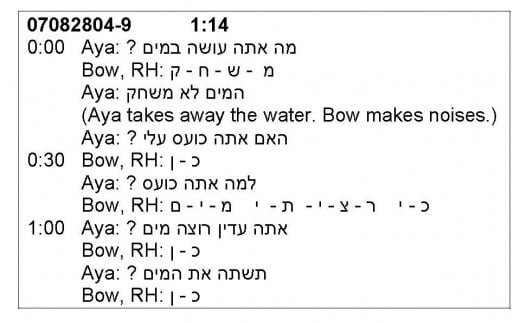
Translation of Clip 07082804-9
AYA: What are you doing with the water?
BOW: Playing.
AYA: Water is not a game. (Aya takes the water. Bow maKes noises) Are you angry with me?
BOW: Yes.
AYA: Why are you angry?
BOW: Because I wanted water.
AYA: Do you still want water?
BOW: Yes.
AYA: Will you drink the water?
BOW: Yes.
As dialogues go, these are very bland. Since then, Bow has said much more interesting things. He can say anything that comes into his mind now. Very often, he tells lies. He is also free to express complex emotions. He schemes. He plans.
However, from a purely linguistic point of view, these dialogues are pretty amazing. Bow has grammar. He can spell out words he has never seen written before. He has picked up the ambient language, like any native speaker. Like many a bilingual child, he is more fluent in one language than in the other, but he does know both.
You would think that the scientific community would be encouraged by these developments. All this was achieved without government funding or any kind of institutional support. It hasn't cost the public one red cent.
In later hubs I will discuss the difficulties we have encountered in making these findings part of the scientifc canon.
(c) 2008 Aya Katz
When Sword Met Bow
LINKS
- Notes from the Pens
A blog about life with Bow.

